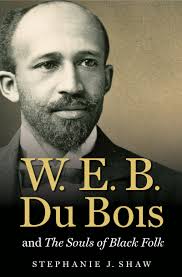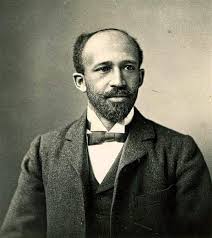The Souls of Black Folk Page #6
The Souls of Black Folk is a 1903 work of American literature by W. E. B. Du Bois. It is a seminal work in the history of sociology and a cornerstone of African-American literature. The book contains several essays on race, some of which the magazine Atlantic Monthly had previously published.
On May 12, 1865, Howard was appointed; and he assumed the duties of his office promptly on the 15th, and began examining the field of work. A curious mess he looked upon: little despotisms, communistic experiments, slavery, peonage, business speculations, organized charity, unorganized almsgiving,—all reeling on under the guise of helping the freedmen, and all enshrined in the smoke and blood of the war and the cursing and silence of angry men. On May 19 the new government—for a government it really was—issued its constitution; commissioners were to be appointed in each of the seceded states, who were to take charge of “all subjects relating to refugees and freedmen,” and all relief and rations were to be given by their consent alone. The Bureau invited continued cooperation with benevolent societies, and declared: “It will be the object of all commissioners to introduce practicable systems of compensated labor,” and to establish schools. Forthwith nine assistant commissioners were appointed. They were to hasten to their fields of work; seek gradually to close relief establishments, and make the destitute self-supporting; act as courts of law where there were no courts, or where Negroes were not recognized in them as free; establish the institution of marriage among ex-slaves, and keep records; see that freedmen were free to choose their employers, and help in making fair contracts for them; and finally, the circular said: “Simple good faith, for which we hope on all hands for those concerned in the passing away of slavery, will especially relieve the assistant commissioners in the discharge of their duties toward the freedmen, as well as promote the general welfare.” No sooner was the work thus started, and the general system and local organization in some measure begun, than two grave difficulties appeared which changed largely the theory and outcome of Bureau work. First, there were the abandoned lands of the South. It had long been the more or less definitely expressed theory of the North that all the chief problems of Emancipation might be settled by establishing the slaves on the forfeited lands of their masters,—a sort of poetic justice, said some. But this poetry done into solemn prose meant either wholesale confiscation of private property in the South, or vast appropriations. Now Congress had not appropriated a cent, and no sooner did the proclamations of general amnesty appear than the eight hundred thousand acres of abandoned lands in the hands of the Freedmen’s Bureau melted quickly away. The second difficulty lay in perfecting the local organization of the Bureau throughout the wide field of work. Making a new machine and sending out officials of duly ascertained fitness for a great work of social reform is no child’s task; but this task was even harder, for a new central organization had to be fitted on a heterogeneous and confused but already existing system of relief and control of ex-slaves; and the agents available for this work must be sought for in an army still busy with war operations,—men in the very nature of the case ill fitted for delicate social work,—or among the questionable camp followers of an invading host. Thus, after a year’s work, vigorously as it was pushed, the problem looked even more difficult to grasp and solve than at the beginning. Nevertheless, three things that year’s work did, well worth the doing: it relieved a vast amount of physical suffering; it transported seven thousand fugitives from congested centres back to the farm; and, best of all, it inaugurated the crusade of the New England schoolma’am. The annals of this Ninth Crusade are yet to be written,—the tale of a mission that seemed to our age far more quixotic than the quest of St. Louis seemed to his. Behind the mists of ruin and rapine waved the calico dresses of women who dared, and after the hoarse mouthings of the field guns rang the rhythm of the alphabet. Rich and poor they were, serious and curious. Bereaved now of a father, now of a brother, now of more than these, they came seeking a life work in planting New England schoolhouses among the white and black of the South. They did their work well. In that first year they taught one hundred thousand souls, and more. Evidently, Congress must soon legislate again on the hastily organized Bureau, which had so quickly grown into wide significance and vast possibilities. An institution such as that was well-nigh as difficult to end as to begin. Early in 1866 Congress took up the matter, when Senator Trumbull, of Illinois, introduced a bill to extend the Bureau and enlarge its powers. This measure received, at the hands of Congress, far more thorough discussion and attention than its predecessor. The war cloud had thinned enough to allow a clearer conception of the work of Emancipation. The champions of the bill argued that the strengthening of the Freedmen’s Bureau was still a military necessity; that it was needed for the proper carrying out of the Thirteenth Amendment, and was a work of sheer justice to the ex-slave, at a trifling cost to the government. The opponents of the measure declared that the war was over, and the necessity for war measures past; that the Bureau, by reason of its extraordinary powers, was clearly unconstitutional in time of peace, and was destined to irritate the South and pauperize the freedmen, at a final cost of possibly hundreds of millions. These two arguments were unanswered, and indeed unanswerable: the one that the extraordinary powers of the Bureau threatened the civil rights of all citizens; and the other that the government must have power to do what manifestly must be done, and that present abandonment of the freedmen meant their practical reenslavement. The bill which finally passed enlarged and made permanent the Freedmen’s Bureau. It was promptly vetoed by President Johnson as “unconstitutional,” “unnecessary,” and “extrajudicial,” and failed of passage over the veto. Meantime, however, the breach between Congress and the President began to broaden, and a modified form of the lost bill was finally passed over the President’s second veto, July 16. The act of 1866 gave the Freedmen’s Bureau its final form,—the form by which it will be known to posterity and judged of men. It extended the existence of the Bureau to July, 1868; it authorized additional assistant commissioners, the retention of army officers mustered out of regular service, the sale of certain forfeited lands to freedmen on nominal terms, the sale of Confederate public property for Negro schools, and a wider field of judicial interpretation and cognizance. The government of the unreconstructed South was thus put very largely in the hands of the Freedmen’s Bureau, especially as in many cases the departmental military commander was now made also assistant commissioner. It was thus that the Freedmen’s Bureau became a full-fledged government of men. It made laws, executed them and interpreted them; it laid and collected taxes, defined and punished crime, maintained and used military force, and dictated such measures as it thought necessary and proper for the accomplishment of its varied ends. Naturally, all these powers were not exercised continuously nor to their fullest extent; and yet, as General Howard has said, “scarcely any subject that has to be legislated upon in civil society failed, at one time or another, to demand the action of this singular Bureau.”
Translation
Translate and read this book in other languages:
Select another language:
- - Select -
- 简体中文 (Chinese - Simplified)
- 繁體中文 (Chinese - Traditional)
- Español (Spanish)
- Esperanto (Esperanto)
- 日本語 (Japanese)
- Português (Portuguese)
- Deutsch (German)
- العربية (Arabic)
- Français (French)
- Русский (Russian)
- ಕನ್ನಡ (Kannada)
- 한국어 (Korean)
- עברית (Hebrew)
- Gaeilge (Irish)
- Українська (Ukrainian)
- اردو (Urdu)
- Magyar (Hungarian)
- मानक हिन्दी (Hindi)
- Indonesia (Indonesian)
- Italiano (Italian)
- தமிழ் (Tamil)
- Türkçe (Turkish)
- తెలుగు (Telugu)
- ภาษาไทย (Thai)
- Tiếng Việt (Vietnamese)
- Čeština (Czech)
- Polski (Polish)
- Bahasa Indonesia (Indonesian)
- Românește (Romanian)
- Nederlands (Dutch)
- Ελληνικά (Greek)
- Latinum (Latin)
- Svenska (Swedish)
- Dansk (Danish)
- Suomi (Finnish)
- فارسی (Persian)
- ייִדיש (Yiddish)
- հայերեն (Armenian)
- Norsk (Norwegian)
- English (English)
Citation
Use the citation below to add this book to your bibliography:
Style:MLAChicagoAPA
"The Souls of Black Folk Books." Literature.com. STANDS4 LLC, 2025. Web. 23 Feb. 2025. <https://www.literature.com/book/the_souls_of_black_folk_310>.








Discuss this The Souls of Black Folk book with the community:
Report Comment
We're doing our best to make sure our content is useful, accurate and safe.
If by any chance you spot an inappropriate comment while navigating through our website please use this form to let us know, and we'll take care of it shortly.
Attachment
You need to be logged in to favorite.
Log In